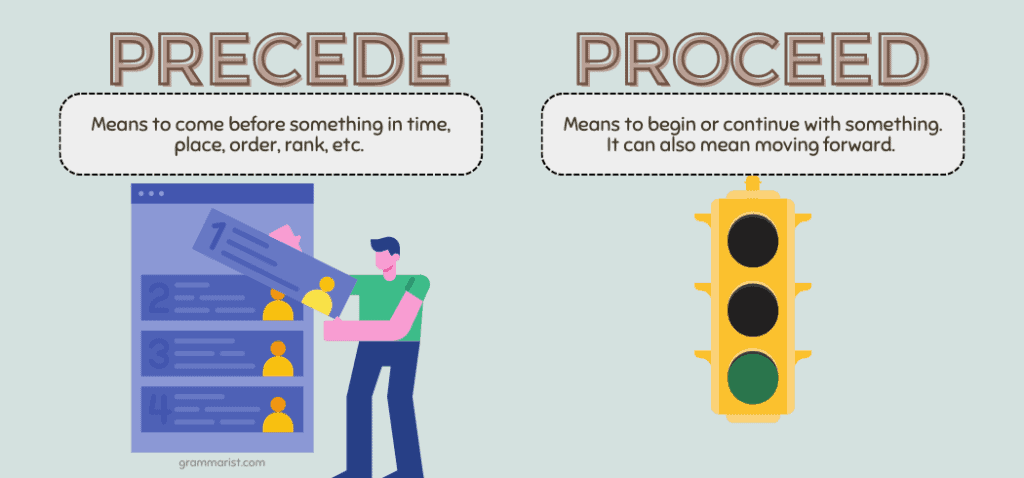English language, you’ve done it again! You’ve confounded us with similar sounding yet distinctly different words: proceed, precede, and…procede? But one of these terms is not like the other and isn’t even a word at all. So, let’s untangle these linguistic strings and learn what each term truly means.
Difference Between Precede vs. Proceed: Their Meanings Explained

Precede and proceed are both verbs, but they’re not homophones and are meant to be used in different contexts.
Precede means to come before something in time, place, order, rank, etc. To give you an idea, a preface precedes the first chapter of a book. It’s like the appetizer before the main course or the opening act before the headliner.
But proceed means to begin or continue with something. It can also mean moving forward. It’s the green light, the cue to go ahead.
- The first chapter precedes the second chapter.
- After reading the first chapter, you can proceed with the second.
Procede vs. Proceed: What’s the Difference?
And now, the third player in our linguistic drama—procede. The big reveal? Procede isn’t even a recognized word in the English language. If you’re using it, chances are you intended to say proceed but fell victim to a common spelling mistake. So, it’s time to bid adieu to procede and correct it to proceed.
Proceeding vs. Preceding: When to Use Both
Proceeding and preceding are the respective present participles of proceed and precede. Proceeding refers to the action of going forward or carrying on, as in, “The meeting is proceeding as planned.” Then, preceding indicates something that came before, like, “The preceding chapters have set the scene beautifully.”
Proceed with or Proceed to?
Both phrases have their uses. You use proceed with when you’re talking about continuing an action or some kind of process that’s already been mentioned or started. But you use proceed to when directing someone to the next step or stage of something.
- You can proceed with the meeting now that I’m here.
- Please proceed to the seating area before the show begins.
Synonyms for Proceed
Just in case proceed doesn’t quite hit the mark, you can choose from these synonyms.
- Continue
- Advance
- Carry on
- Move forward
- Go ahead
Synonyms for Precede
Prefer not to use precede? Here are some pretty good alternatives.
- Antecede
- Forego
- Herald
- Beforehand
- Predate
Proceed Examples in a Sentence

Let’s march forth with some sentences featuring proceed.
- The children’s Christmas concert will proceed after a brief intermission.
- The researchers proceeded with the experiment despite initial setbacks because they needed to finish.
- I’m proceeding with the divorce; I can’t do this anymore.
How to Use Precede in a Sentence
And now, sentences with precede are taking center stage.
- Can you believe the invention of the telephone preceded the creation of the internet by over a century?
- Formal introductions usually precede a royal audience, just so you know.
- I need you to fix the formatting and make sure that the prologue precedes the first chapter.
Don’t Worry, You’ll Get it!
So, there you have it. Precede and proceed are two valid words with unique meanings, and procede is an impostor unmasked as a misspelling of proceed. Remember, precede is all about what comes before; proceed is your green light to move forward. As for procede? Let’s just, ahem, proceed without it.
